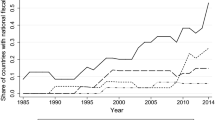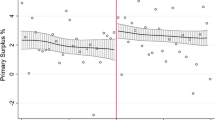Abstract
Field data on the strategic use of deficits to limit thebudgetary scope of future governments are inconclusive aboutthe effects of political polarization or a government'sre-election probability on fiscal policy. Therefore, wedesigned a controlled experiment to examine the strategic useof deficits. Using a within-subjects design, we find thatdeficits rise with a higher degree of polarization and a lowerreelection probability. However, in a between-subjects designneither polarization nor reelection probabilities have asystematic effect. We discuss the implications of ourexperimental results for empirical tests of the strategic useof deficits with field data.
Similar content being viewed by others
References
Aghion, P. and Bolton, P. (1990). Government debt and the risk of default: A political economic model of the strategic role of debt. In: Dornbusch, R. and Draghi, M. (Eds.), Public debt management: Theory and practice. Cambridge, UK: Cambridge University Press.
Alesina, A. and Perotti, R. (1995). The political economy of budget deficits. IMF Staff Papers 42: 1–31.
Alesina, A. and Tabellini, G. (1990). A positive theory of fiscal deficits and government debt. Review of Economic Studies 57: 403–414.
Borelli, S. and Royed, T.J. (1995). Government 'strength' and budget deficits in advanced democracies. European Journal of Political Research 28: 225–260.
Crain, M.W. and Tollison, R. (1993). Time inconsistency and fiscal policy: Empirical analysis of U.S. states, 1969–89. Journal of Public Economics 51: 153–159.
Haan, J., de and Sturm, J.-E. (1994). Political and institutional determinants of fiscal policy in the European Community. Public Choice 80: 157–172.
Haan, J., de and Sturm, J.-E. (1997). Political and economic determinants of budget deficits and of government spending: A reinvestigation. European Journal of Political Economy 13: 739–750.
Edin, P.-A. and Ohlsson, H. (1991). Political determinants of budget deficits: Coalition effects versus minority effects. European Economic Review 35: 1597–1603.
Ehrhart, K.-M., Gardner, R., Keser, C. and von Hagen, J. (1999). Budget processes: Theory and experimental evidence. University of Karlsruhe, mimeo.
Fischbacher, U. (1999). Z-tree: Zurich toolbox for readymade economic experiments.Working paper No. 21, Institute for Empirical Research in Economics, University of Zurich.
Franzese, R.J. Jr. (2001). The political economy of public debt: An empirical examination of the OECD postwar experience. Version presented to the Workshop on Political Economy at the Berglas School of Economics at Tel Aviv University, 30–31 January 2001.
Grilli, V., Masciandaro, D. and Tabellini, T. (1991). Political and monetary institutions and public finance policies in the industrial democracies. Economic Policy 13: 341–392.
Huber, G., Kocher, M.G. and Sutter, M. (2002). Government strength, power dispersion in governments and budget deficits in OECD-countries. A voting power approach. Public Choice, forthcoming.
Lambertini, L. (2000). Are budget deficits used strategically? UCLA, mimeo.
Milesi-Ferretti, G.M. (1995). The disadvantage of tying their hands: On the political economy of policy commitments. Economic Journal 105: 1381–1403.
Milesi-Ferretti, G.M. and Spolaore, E. (1994). How cynical can an incumbent be? Strategic policy in a model of government spending. Journal of Public Economics 55: 121–140.
Persson, T., Svensson, L.E.O. (1989).Why a stubborn conservative would run a deficit: Policy with time-inconsistent preferences. Quarterly Journal of Economics 104: 325–346.
Pettersson-Lidbom, P. (2001). An empirical investigation of the strategic use of debt. Journal of Political Economy 109: 570–583.
Riedl, A. and van Winden, F. (2001). Does the wage tax system cause budget deficits?. Public Choice 109: 371–394.
Roubini, D. and Sachs, J. (1989a). Government spending and budget deficits in the industrialized countries. Economic Policy 8: 99–132.
Roubini, D. and Sachs, J. (1989b). Political and economic determinants of budget deficits in the industrial countries. European Economic Review 33: 903–938.
Schultz, K. (1995). The politics of the political business cycle. British Journal of Political Science 25: 79–100.
Tabellini, G. and Alesina, A. (1990). Voting on the budget deficit. American Economic Review 80: 37–49.
Volkerink, B. and de Haan, J. (2001). Fragmented government effects on fiscal policy: New evidence. Public Choice 109: 221–242.
Author information
Authors and Affiliations
Rights and permissions
About this article
Cite this article
Sutter, M. The Political Economy of Fiscal Policy: An Experimental Study on the Strategic Use of Deficits. Public Choice 116, 313–332 (2003). https://doi.org/10.1023/A:1024842401703
Issue Date:
DOI: https://doi.org/10.1023/A:1024842401703




